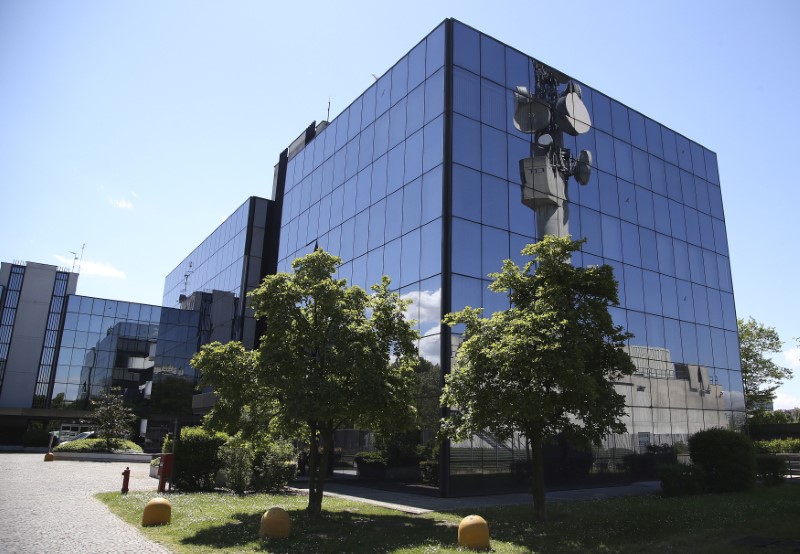By Stephen Jewkes and Christoph Steitz
MILAN/FRANKFURT (Reuters) - After a fortnight living in a mobile home compound built in just three days by his employer, Italian gas company Snam (MI:SRG), Guido Debattisti is returning home.
The 37-year-old is part of a team of engineers sealed off during two-week shifts to make sure gas taps stay open - and buildings warm - during a coronavirus epidemic that has killed more than 7,000 Italians and is sweeping Europe.
So far, the hastily-assembled plan at Snam's control centre in Milan, which remotely operates 33,000 kilometres (21,000 miles) of gas pipes across Italy, is working.
"The team working in the dispatching centre - made up of six people for each shift, as well as two colleagues connected remotely via Skype video-conferences - has succeeded in carrying out all activities related to grid control," Debattisti told Reuters, before heading back to his home in nearby Pavia.
With countries across Europe in lockdown to try to contain the virus, gas and power grid operators are scrambling to roll out emergency plans to make sure their control rooms are safe from infection and can keep critical infrastructure running.
Potentially at risk are more than 12 million kilometres (km) of networks, or 31 times the distance to the moon - Europe's energy nerve centre on which hundreds of millions of residential and commercial customers depend.
Adding to the headache is a plunge in demand as economies grind to a halt.
Because renewable energy has priority in supplying power grids, this has meant wind and solar generation providing a greater proportion of electricity than ever before.
But these intermittent sources of power make it harder to keep grids stable, increasing the risk of blackouts.
Debattisti, like the rest of his team, is screened before starting his shift to make sure he is not infected.
After that, it is lockdown in the compound with a kitchen and small canteen for eating. In his 16 years at Snam, he has known nothing like it.
ISOLATION
About 500 km to the north in Germany's motor city of Stuttgart, utility EnBW (DE:EBKG) is considering a similar move to house key staff at the network control centre.
So far there's been no need to do that, a spokeswoman said, adding all the accommodation preparations had still to be made.
Johannes Teyssen, chief executive of Europe's largest networks operator E.ON (DE:EONGn), said hundreds of employees were prepared to live and work in dormitories and be kept in de-facto isolation to keep grids humming.
"It's not going to be pleasant," he told journalists on Wednesday.
Italy's power grid manager Terna (MI:TRN) has a plan B and C to keep the electrons flowing on its 74,000 km high voltage network. The company has six regional control rooms across the country and two central ones in Rome, each of which operates three shifts.
Plan B involves shuffling around business should any of the rooms go down, while plan C is triggered if two of the three regular shifts are grounded - in which case a team is segregated in a centralised control room for 15-day periods living in camper vans.
The system means that with just 20% of staff, Terna should be able to guarantee continuity of service.
At Austrian utility Wien Energie, measures have been particularly drastic. There, 53 employees have agreed to live apart from their families for potentially several weeks to make sure plants can run smoothly.
They were checked before going into isolation at the power stations, where they will live separated from the outside world, Wien Energie said.
Poland's power grid operator, PSE, is also taking radical steps to try to prevent workers from getting contaminated and to keep supplies flowing.
"The level of security, especially regarding the employees' movements within the premises of PSE, is analogous to the level that is launched during a high terrorist threat," a spokeswoman said.
In the United Kingdom and Ireland, access to control rooms is being minimised and teams split to reduce the risk of cross-infection to keep energy flowing, according to the Energy Networks Association.
NEW TESTS
Alongside the risk of contagion, grid companies are having to cope with a slump in energy demand.
Many industrial companies, most notably carmakers and suppliers, are suspending production, hitting demand and putting a strain on grids at a time when they are already struggling to cope with a high proportion of intermittent renewable supplies.
The drop in demand is robbing markets of a key source of flexibility: industrial plants often act as grid stabilisers by using their own power generators to help balance less reliable wind and solar inflows.
"System operators have developed ways to manage these challenges, but extraordinary developments – such as lockdowns of entire countries during global pandemics – create new tests," Fatih Birol, executive director of the International Energy Agency, said earlier this week.
In Germany, Europe's largest economy, energy consumption on March 23 was about 5% lower than the average for the same day over the past three years, industry association BDEW said.
"People typically think of power outages as happening when demand overwhelms supply," Birol said. "But in fact, some of the most high-profile blackouts in recent times took place during periods of low demand."
